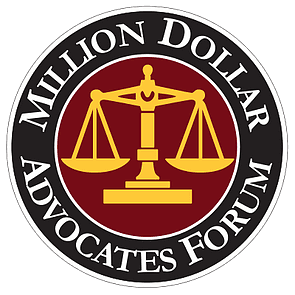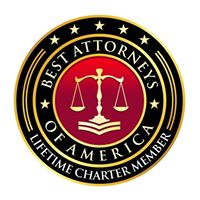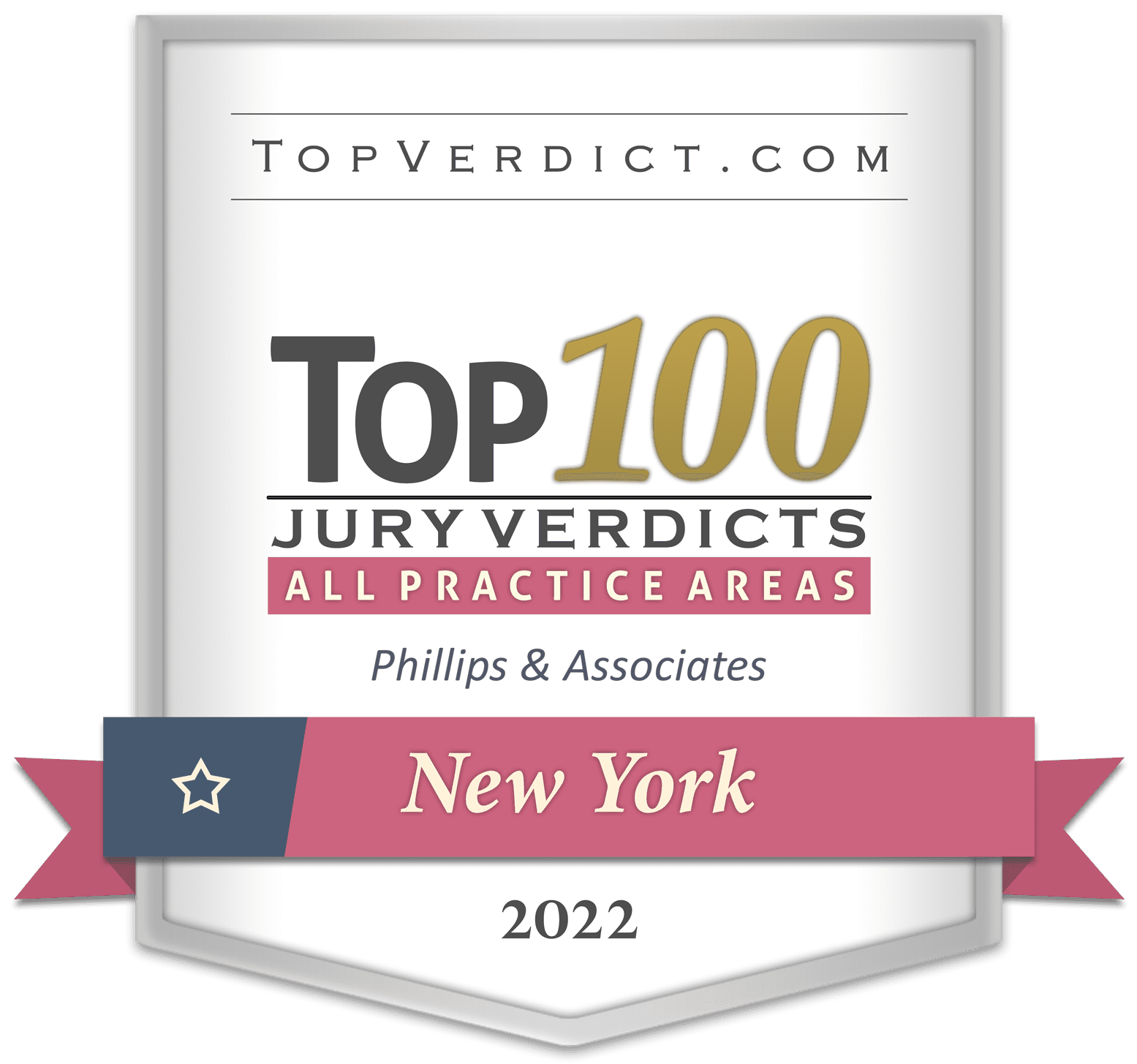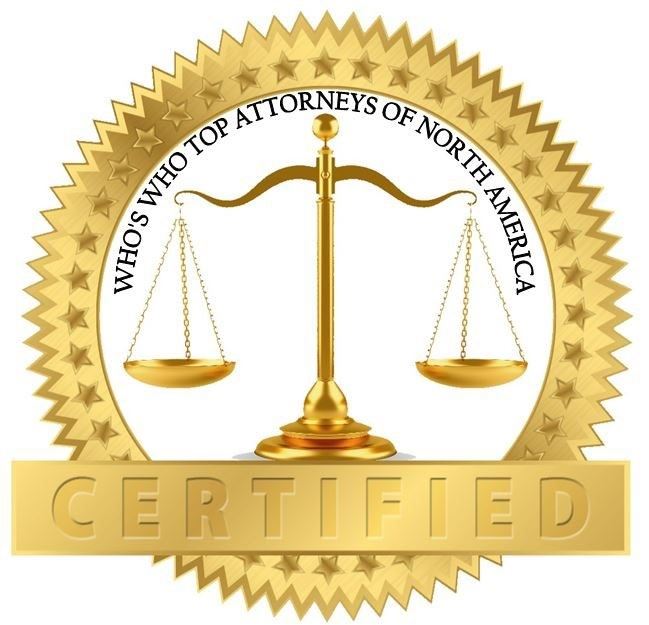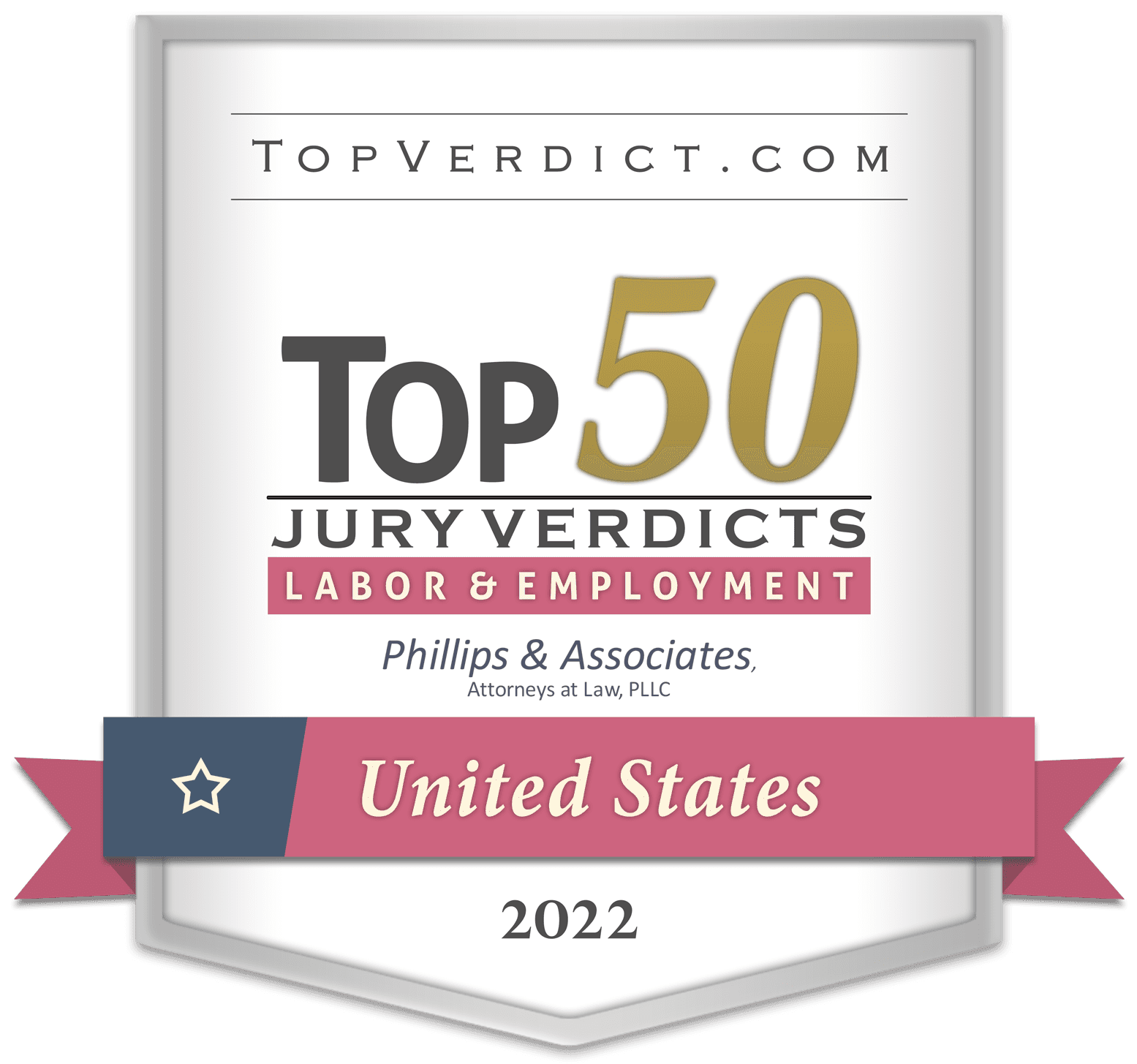
Employment Discrimination Attorneys in New York City
Protecting Your Workplace Rights in New York, New Jersey, Pennsylvania, & Florida
In New York City, federal, state, and local laws protect you against employment discrimination. Employment discrimination laws make it illegal for an employer to refuse to hire you, terminate you, pay you less, not promote you, or otherwise treat you adversely because of your membership in a protected class. Certain classes, such as race, sex, national origin, religion, and disability, are protected under federal, state, and local laws, while others are protected only under state or local laws.
If you believe that you have been treated adversely based on your membership in a protected class, you should consult an experienced New York City employment discrimination lawyer at Phillips & Associates, Attorneys at Law.
The New York City Human Rights Law
The New York City Human Rights Law is widely believed to be one of the most protective employment discrimination laws in the country. It applies to smaller employers in New York City. It protects the following characteristics: Age, alienage, arrest or conviction record, color, caregiver status, disability, credit history, gender, gender identity, marital status, national origin, pregnancy, religion or creed, salary history, sexual orientation, domestic violence victim status, unemployment status, and veteran or military service member status.
It is illegal for your employer to retaliate against you because you filed a complaint, opposed an illegal practice, or testified or assisted in a proceeding or investigation. It is also illegal to discriminate against you in terms of what you are paid, your participation in training programs, or other terms, conditions, or privileges of employment due to your membership in a protected category.
An employer is also not permitted to print or circulate job ads that restrict who should apply based on protected categories, unless this restriction is based on a bona fide occupational qualification.
There are certain specific rules regarding arrests and convictions. It is illegal for a company to refuse to hire you because of a criminal record or conviction, unless that conviction is directly related to your job duties or presents an unreasonable risk to people or property. However, employers can ask about existing criminal convictions. They cannot ask about arrests that may have been resolved in your favor, whether they were dismissed, the prosecutor declined to prosecute, or you received a Youthful Offender adjudication.
Reasonable Accommodations
There are a number of situations under which you may be entitled to a reasonable accommodation under the New York City Human Rights Law. The exception in any of these circumstances is when providing the reasonable accommodation would present an undue hardship for your employer. A reasonable accommodation should be provided if you are disabled or impaired physically, medically, mentally, or psychologically, or if you have a history of this type of impairment. A reasonable accommodation should also be provided for pregnancy, childbirth, post-partum recovery, and medical conditions related to pregnancy or childbirth; an employee or job applicant’s religious observances; and if you have been subjected to domestic violence, sexual violence, or stalking.
Federal Laws
Federal employment discrimination laws may also apply to your situation, but usually they only apply to employees of companies or organizations that are mid-sized or large. In most situations, the remedies provided under New York City law are the most favorable to employees, but there may be circumstances in which federal law provides a better remedy. You should consult an attorney about the specifics of your situation.
Discuss Your Case with Our New York City Employment Discrimination Lawyers
If you believe your employer has violated employment discrimination laws, and you have been harmed, you should consult Phillips & Associates, Attorneys at Law.
Call us at (866) 229-9441 or contact us through our online form.
Types of Discrimination
Many New Yorkers are unaware of the wide range of protections against employment discrimination available to them under federal, state, and local laws. At Phillips & Associates, Attorneys at Law our New York City employment discrimination lawyers can provide knowledgeable representation to job applicants or employees who experience discrimination, whether it is based on sex, race, sexual orientation, a prior criminal conviction, age, disability, or another protected characteristic.
Age Discrimination
The Age Discrimination in Employment Act of 1967 (ADEA) is the federal law that prohibits employers from discriminating against employees who are at least 40 years old because of their age. It applies to employers with at least 20 employees. New York State and local laws also prohibit age discrimination in workplaces and applies to employers with less than 20 employees.
Criminal Convictions
There is no federal law that prohibits employers from discriminating against a job applicant or employee on the basis of a criminal conviction. However, New York State law prohibits discrimination on the basis of a criminal conviction, unless hiring an applicant would present a property or safety risk or the criminal conviction directly affects the worker's ability to perform the sought-after job.
Disability Discrimination
It is illegal under federal, state, and local laws to make employment decisions on the basis of a job applicant or employee's disability. Additionally, employers are required to provide reasonable accommodations for applicants or employees with disabilities, unless doing so would present an undue hardship. Our employment discrimination attorneys in New York City can advise you on what a reasonable accommodation might involve.
Gender/Sex Discrimination
An employer may not discriminate against a job applicant or employee due to gender or sex under Title VII of the Civil Rights Act, the New York State Human Rights Law, or the New York City Human Rights Law. Employers are not allowed to make employment decisions related to hiring, firing, layoffs, promotions, compensation, training, work conditions, job benefits, or any other aspect of employment because of an employee's gender or sex. Sexual harassment is one form of prohibited sex discrimination.
Glass Ceiling
Both women and minorities often hit a glass ceiling in their careers when climbing the corporate ladder. Employers are not allowed to base their decisions regarding whether to promote an employee or how much to pay them based on sex or race under federal, state, or local laws.
National Origin Discrimination
Employers may not discriminate against job applicants or employees on the basis of their national origin under federal, state, or local laws. Sometimes, an employer does not explicitly refer to the employee's country of origin. Instead, this type of discrimination may center on a perceived ethnic background, accent, or ancestry.
Race Discrimination
Employers cannot discriminate on the basis of race under federal or state laws. In some cases, there is no explicit reference to race in a discriminatory job advertisement or decision. Sometimes, an attorney can help you bring a race discrimination lawsuit on the basis of disparate treatment, which means that an employer's action disparately affects individuals of a particular race. Additionally, racist comments and racial slurs in the workplace are illegal.
Religious Discrimination
Federal, state, and local laws prohibit religious discrimination. Any sincerely held religious, ethical, or personal belief is protected. Employers are also supposed to provide reasonable accommodations for employees' religious practices and beliefs, except when it causes an undue hardship. For example, if you need to alter your schedule because you observe fasting during Ramadan, this may require your employer to provide a reasonable accommodation. Comments regarding a person’s religious beliefs are also illegal in the workplace and can lead to a hostile work environment.
Sexual Orientation Discrimination
Federal laws do not expressly prohibit sexual orientation discrimination. The New York State Human Rights Law and the New York City Human Rights Law prohibit sexual orientation discrimination against employees and job applicants. Prohibited sexual orientation discrimination can include harassment.
Discrimination During the Interview or Hiring Process
Many people assume that they are only protected by anti-discrimination laws once they are hired. You are also protected as a job applicant during the interview or hiring process. It can be difficult to know for sure whether the reason why you were denied a job was because of a protected characteristic, such as race, religion, gender, disability, national origin, or age. However, the questions that you are asked may reveal a prospective employer's bias. If a prospective employer is asking questions regarding your pregnancy, you may want to speak with an attorney to understand your rights. It’s also illegal to make sexual advances during an interview or anytime during an employment application process.
Discrimination Against the Unemployed
The New York City Human Rights Law prohibits discrimination against the unemployed, unless an employer has a substantially job-related reason for the action. Employers are allowed to ask about why you left your prior job, and employers are also allowed to decide that applicants whom they employ will be hired in a role or given priority.
Holiday Parties & Discriminatory Remarks
Alcohol at holiday parties can loosen inhibitions. You may be able to hold your employer responsible for discrimination or harassment at a holiday party, even if it is held somewhere other than the office or after business hours. Title VII of the Civil Rights Act, the Americans with Disabilities Act, the ADEA, the New York State Human Rights Law, the New York City Human Rights Law, and other laws may provide protection against discriminatory remarks at holiday parties.
Unfortunately, sexual harassment does occur during holiday parties. The sexual harassment can come in the form of sexual comments, jokes, or innuendos. You may receive inappropriate text messages or perhaps your boss (or coworker) exposed themselves to you. In some instances, your boss (or coworker) may make requests for sexual favors. Extreme cases can result in a sexual assault or even rape.
Do not be silent — consult with our lawyers to discuss any sexual harassment in the workplace or at holiday parties.
Were you sexually harassed or sexually assaulted a couple of years ago but were afraid to report it? You may still have a claim.
Contact a Lawyer
In many cases, more expansive protections for job applicants and employees are provided under state and local laws than under federal laws. Our experienced attorneys are closely familiar with many different types of discrimination. We can determine an approach that is likely to succeed in a client's particular circumstances.
Contact us at (866) 229-9441 or through our online form.
Discrimination FAQs
What Is Age Discrimination in an Employment Context?
Age discrimination occurs when an employer makes an adverse employment decision based on a job applicant or employee's age. It is prohibited against people who are 40 or older and working for a company with at least 20 employees under the Age Discrimination in Employment Act (ADEA). However, the New York State and New York City Human Rights Laws also prohibit age discrimination at smaller companies for people who are 40 or older.
What Is Color Discrimination in an Employment Context?
Color discrimination occurs when an employer makes an adverse employment decision based on a job applicant or employee's color. It is closely related to race discrimination. For example, if your employer does not want to put you in a customer-facing position because you are black and have light brown skin, and it says that it wants someone who is more "all-American" to interact with customers, this is color discrimination. It is likely actionable under Title VII of the Civil Rights Act, the New York State Human Rights Law, or the New York City Human Rights Law.
What is Gender Discrimination in an Employment Context?
Gender discrimination occurs if your employer or prospective employer uses your gender to make an employment decision. You can be a victim of discrimination whether you are a woman or a man, and regardless of which gender your boss is. Discrimination can involve hiring, firing, promoting, demoting, classifying, segregating, harassing, or reassigning a job applicant or employee based on their gender. It is illegal under Title VII, as well as the New York State and City Human Rights Laws. Under federal law, it is illegal for employers to pay women less than what men are paid for the same work.
What is Gender Identity Discrimination in an Employment Context?
Gender identity includes actual or perceived gender identity and gender expression, as well as being transgender. It is illegal for an employer to discriminate against an employee on the basis of gender identity in the State of New York or in New York City. Although the Equal Employment Opportunity Commission (EEOC) has stated that gender identity discrimination is a form of sex discrimination under Title VII, the protection is not express, so it is not as clear under federal law as it is under the New York City Human Rights Law. Under the New York City Human Rights Law, an employer that intentionally refuses to use your preferred name, pronoun, or title is perpetrating gender identity discrimination. It may be possible to sue for damages with the assistance of an experienced attorney.
What is LGBT Discrimination in an Employment Context?
LGBT discrimination occurs when somebody is subjected to discrimination due to their sexual orientation or gender identity. The Sexual Orientation Non-Discrimination Act (SONDA) protects employees at the state level from discrimination based on their actual sexual orientation or the sexual orientation that they are perceived as having. The New York City Human Rights Law also prohibits LGBT discrimination. LGBT discrimination would occur, for example, if you were not hired because you are gay, or because you are perceived by a prospective employer as being gay, due to the employer's stereotypes about how gay people act.
Which Laws Prohibit Medical Condition Discrimination in an Employment Context?
Medical condition discrimination occurs when an employee is treated differently in the workplace due to a real or perceived medical condition. There is no list of medical conditions that are covered by anti-discrimination laws. Under the Americans with Disabilities Act (ADA), a medical condition can be a covered disability when it substantially restricts a major life activity. You are also protected if you have a record of such an impairment, or you are perceived as having an impairment. The New York State Human Rights Law covers smaller employers and has a broader definition of disability.
What is National Origin Discrimination in an Employment Context?
National origin discrimination occurs in an employment context when an employer takes an employment action based on your country of origin or perceived country of origin. For example, if your employer refuses to promote you because he believes that you are Middle Eastern, this is national origin discrimination. It would also be a form of national origin discrimination if your coworkers harassed you because you are perceived as African.
What is Pregnancy Discrimination in an Employment Context?
Pregnancy discrimination is forbidden under federal, state, and local laws. It is considered a form of gender discrimination under Title VII of the Civil Rights Act of 1964. Under state and local laws, you may be entitled to reasonable accommodations for pregnancy-related conditions.
What is Religious Discrimination in an Employment Context?
Under Title VII of the Civil Rights Act of 1964, as well as state and local laws, employers cannot treat you differently due to your sincerely held religious belief or practice. They cannot make employment decisions, such as those involving hiring, recruiting, assignments, promotion, or discipline, due to your religious beliefs. They cannot subject you to hostile workplace harassment because of these beliefs. Furthermore, they are required to provide a reasonable accommodation for a sincerely held religious belief, except when to do so would pose an undue hardship. Even non-traditional religious beliefs are protected as long as they are sincerely held.
Consult a Skillful Attorney for Your Discrimination Claim
At Phillips & Associates, Attorneys at Law we may be able to help you recover damages if you were subject to workplace discrimination.
Contact us at (866) 229-9441 or through our online form.
What Our Clients Say:
-
"He covered every angle and was able to help me with my dispute. I would recommend Jesse Weinstein and Phillips and Associates in the future to anyone."
- Margaret -
"Being in the restaurant industry for more than 30 years I can say that this law firm is the number one choice for workers in the restaurant business that need to sue their company for wrongful termination."
- Massimo -
"He was extremely patient and understanding throughout the process and remained professional and consistent even when I could not. I really felt like he had my back and I didn't have to worry."
- Karen



.2306081245574.png)

